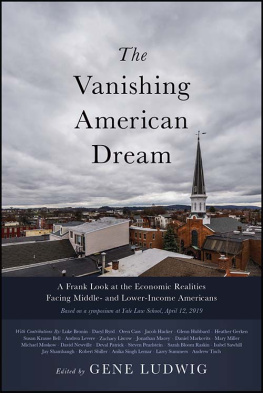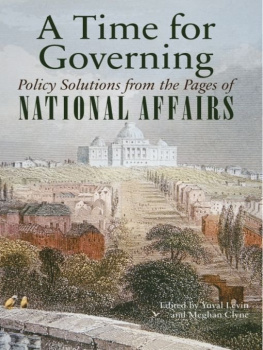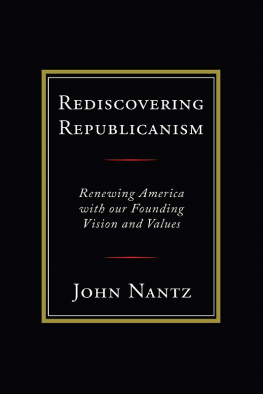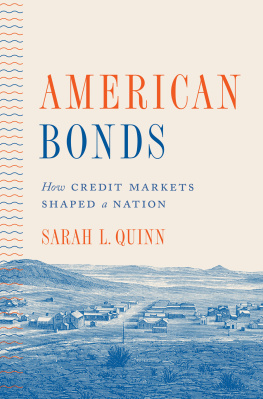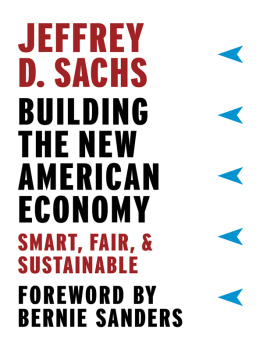THE FORGOTTEN AMERICANS
ISABEL SAWHILL
The Forgotten Americans
AN ECONOMIC AGENDA FOR A DIVIDED NATION

Published with assistance from the foundation established in memory of Amasa Stone Mather of the Class of 1907, Yale College.
Copyright 2018 by Isabel Sawhill. All rights reserved. This book may not be reproduced, in whole or in part, including illustrations, in any form (beyond that copying permitted by Sections 107 and 108 of the U.S. Copyright Law and except by reviewers for the public press), without written permission from the publishers.
Yale University Press books may be purchased in quantity for educational, business, or promotional use. For information, please email (U.K. office).
Set in Scala type by Westchester Publishing Services.
Printed in the United States of America.
Library of Congress Control Number: 2018942605
ISBN 978-0-300-23036-9 (hardcover : alk. paper)
A catalogue record for this book is available from the British Library.
This paper meets the requirements of ANSI/NISO Z39.48-1992
(Permanence of Paper).
10 9 8 7 6 5 4 3 2 1
PREFACE
LIKE MANY PEOPLE, I WAS DUMBFOUNDED by the 2016 election. I began working on this book before the election and then had to rethink it afterward. Who was it that voted for Trump? What is it about their lives that caused them to vote for him? And, most importantly, what should an economic policy look like in the post-Trump era? I began to question old assumptions about what might be both effective and politically feasible in this new era, which required that I reexamine almost everything I thought I knew. Can we boost the rate of long-term economic growth enough to make a lot of people better off, or is that a pipe dream? Are unprecedented levels of inequality here to stay, or can we redistribute whatever level of prosperity we have more broadly? How do we achieve a broader version of prosperity in todays toxic political environment? What might work best, given the countrys attitudes and existing institutions?
This book wrestles with these questions. It argues for policies that are better aligned with American values and responsive to peoples actual day-to-day needs. It focuses on the value of work and the importance of jobs and wages. Work is a unifying concept, something everyone understands and supports. But we need a more honest accounting of what does and does not improve peoples job prospects. That means getting beyond simple trickle-down and trickle-up theories and political rhetoric about their importance. In late 2017, Congress enacted a giant tax bill sold to the public in trickle-down clothes. On the left, there was talk of the need for a universal basic income where income would almost magically trickle up to literally everyone. Those are, for the most part, fake remedies. Instead, we need to better prepare people for the jobs that exist and use the tax system and a more inclusive form of private-sectorled capitalism to boost the job opportunities and wages of the bottom half.
Although I am a solutions-oriented economist, I like to ask basic questions, review evidence on what we know about them, and guide the nonacademic reader through the underbrush and the data to a set of hopefully reasonable conclusions. In the process, I learn a lot. My hope is that readers with a serious interest in such topics as growth, inequality, and the labor market will benefit from this review. Whether one agrees with my ideas or not, their foundations should be transparentthe basis for a healthy dialogue.
On a more personal note, I have long believed that life is unpredictable and often unfair. For this reason, much of my career has been devoted to studying poverty and inequality. More often than not that leads to a focus on the poorest Americans. But just above them is a group that believes it is playing by the rules and not getting ahead. Of course, the poor deserve compassion but they have gotten plenty of scholarly attention. The working and middle classes have received less. All of them are part of a group I call the forgotten Americans.
I have also focused a lot of my work on opportunityon what scholars call intergenerational social mobility. Together with my colleague Ron Haskins, I wrote a book on Creating an Opportunity Society. We developed and have jointly written about the success sequencethe idea that if you get an education, work fulltime, and wait to have children until you are married or in a committed relationship, you will have a good chance of escaping poverty and joining the middle class. In my most recent book, Generation Unbound: Drifting into Sex and Parenthood without Marriage, I tackled the family piece of the success sequence, calling for a shift in norms and for greater use of long-acting forms of contraception to produce more responsible parenting and family formation. In this book, I focus on work. If I stick to the success sequence frame, my next book will have to be about education!
I have the good fortune to have had a long career as a scholar at the Brookings Institution. I work with some of the smartest and best-informed people imaginablea rare privilege. As an economist who has served in government, and been on the firing line for making difficult decisions in President Clintons Office of Management and Budget, I take a pragmatic approach to most problems. I am no fan of President Trump but still hope that Republicans will reach out to that broader slice of America they seem to have forgotten of late, despite the presidents rhetoric. Their messaging is fine; their policies are wanting. As for Democrats, I admire their fighting spirit and their compassion but believe there is a risk that they will overplay their hand, pleasing their base but neglecting the moderate but quiet middle that wants stability, pragmatism, and dignity in public life, not a new swerve to the left.
I have many people to thank for help with this book. First and foremost is Eleanor Krause. She was my research assistant at Brookings through this period. I have marveled at her patience, her work ethic, her ability to see long before I did the many flaws in the book (some of which, Im sure, remain), and her willingness to tackle almost any subject and master it in short order. In her spare time, she climbs cliffs and rides a bike in zero-degree weather. Nothing is too hard for her.
Richard Reeves, Alice Rivlin, and Robert Reischauer all gave especially generously of their time to help me see ways to improve the manuscript. Richard proved that its possible to teach an aging scholar how to write or think more clearly. Other colleagues to whom I am grateful for advice on the book include Henry Aaron, Martin Baily, Ben Bernanke, Emily Bowden, Elaine Kamarck, Gary Burtless, Bill Galston, Ted Gayer, Carol Graham, Josh Gotbaum, Ron Haskins, Delaney Parrish, Jonathan Rauch, Molly Reynolds, Martha Ross, and David Wessel.
Outside of Brookings, I received valuable comments from Dominic Barton, Harry Holzer, Elisabeth Jacobs, Tamar Jacoby, Robert Solow, Steven Pearlstein, Christopher Schroeder, Ben Veghte, and the Gang of 10, my favorite group of business economists.
Many family members and friends have also read or suffered through interminable discussions of very early drafts of this book. Among this group, I especially want to thank David Adoff, Sarah and Win Brown, Monroe and Fred Hodder, Bob and Jane Stein, Sally and Ed Supplee, Hildy Teegen, and Jamie and Evelyn Sawhill.
Finally, I want to thank Seth Ditchik at Yale University Press for giving me the right advice when I needed it most, and Adriana Cloud, Ann-Marie Imbornoni, and Debbie Masi for careful attention to the copyediting and production of the manuscript.
Next page

